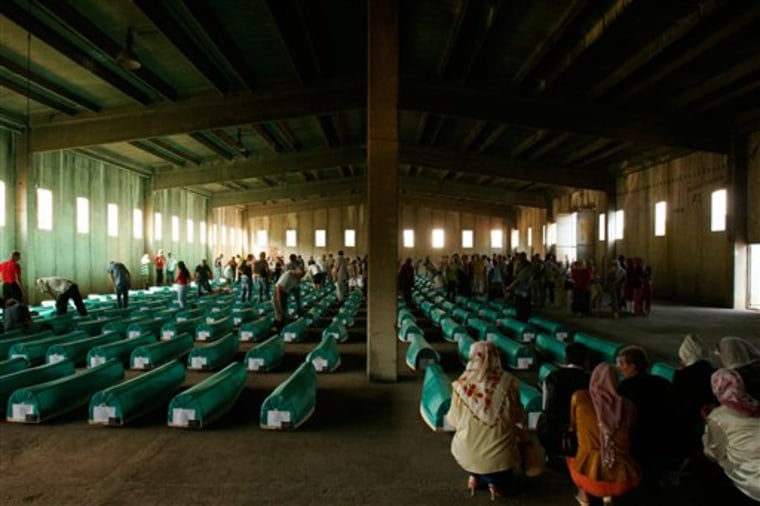Coffins containing the remains of 307 Bosnian war victims are being transported to a cemetery in Srebrenica for burial on the 13th anniversary of Europe's worst massacre since World War II.
Hundreds of people in Sarajevo came out Wednesday to watch two trucks carrying the coffins pass through the capital and to pay their respects to the victims of the 1995 massacre in the eastern town of Srebrenica.
The coffins, which contain remains of victims identified through DNA tests, will be buried in a ceremony Friday.
Some 8,000 Muslim men and boys were killed in Srebrenica over several days when Serb forces overran the town in 1995. The youngest victim of the 307 was 15 and the oldest 84.
Tens of thousands of people are expected to attend Friday's funeral, including local and international officials.
Like the nearly 3,000 victims already buried at the Srebrenica-Potocari memorial center, the 307 were found in mass graves near Srebrenica, identified and returned to their families.
During the war, Srebrenica was officially under U.N. protection, but about 450 Dutch soldiers on peacekeeping duty stood by helplessly as thousands of Bosnian Serb forces stormed the area in July 1995.
Declared a genocide
The International Court of Justice in The Hague declared last year that Bosnian Serb troops committed genocide in Srebrenica.
The main two suspects being sought for the Srebrenica massacre — former Bosnian Serb leader Radovan Karadzic and his general, Ratko Mladic, were indicted 12 years ago and remain at large. NATO forces that deployed after a peace agreement was signed in December 1995 did not immediately pursue them, and Serb authorities refused to arrest war crimes suspects for almost a decade.
Under the peace agreement, Bosnia is divided in two ministates — one controlled by Orthodox Serbs, and the other a federation of Muslim Bosniaks and Catholic Croats. Although the two are linked by a few central institutions, each has wide autonomy and its own institutions, including president, parliament, government and police.
Srebrenica ended up in the Serb part of the country.
Cousins on trial
Meanwhile, the aftermath of the war continues.
At The Hague on Wednesday, two Bosnian Serb cousins were on trial for allegedly murdering scores of Muslims in what a prosecutor described as one of the most successful campaigns of ethnic cleansing in the Bosnian war.
Prosecutors allege that Milan Lukic led a unit known as both the "White Eagles" and "Avengers" in the eastern Bosnian town of Visegrad during the 1992-1995 Bosnian war and that his cousin Sredoje Lukic was a member.
Both men have pleaded not guilty to charges including murder, extermination and persecution.
And in Belgrade, Serbia's new justice minister, Snezana Malovic, promised on Wednesday that authorities will do all they can to hunt down Karadzic, Mladic, and other war crime fugitives sought by the U.N. tribunal.
